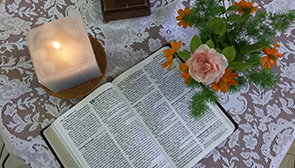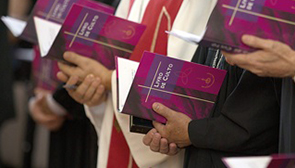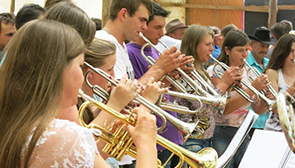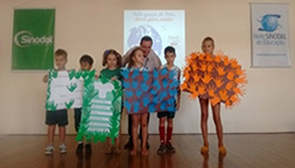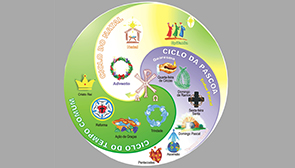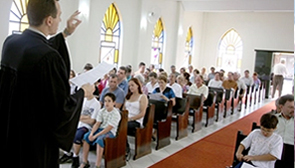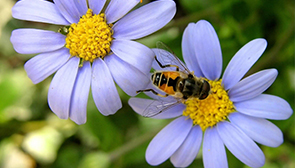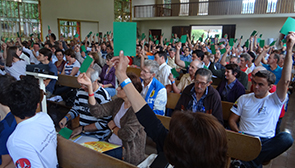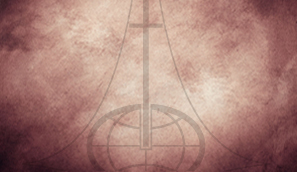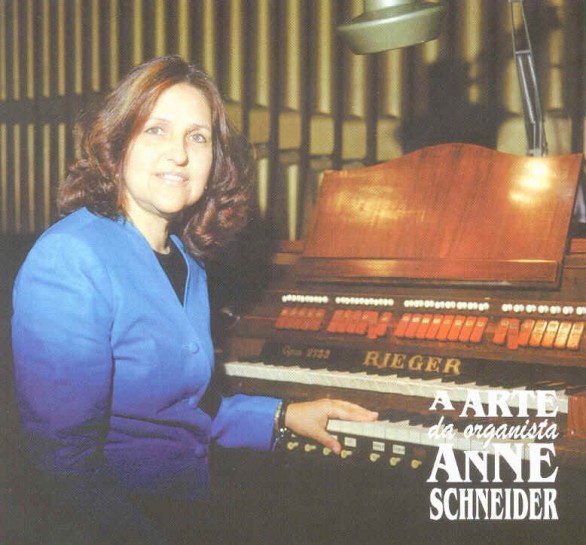
THE ART OF THE ORGANIST ANNE SCHNEIDER
Pictured.from the mythological Pan's flute, the organ, big and very antique polyphonic instrument, gives transcendental sonority to the religious cult and bright to the profane music. Its art is difficult. To the ability of the hands, dividing into several keyboards, should be joined the ability of the feet, which move the pedais. The organists, refined artists, perform pilgrimages to the most beautiful cathedrals where magnificent instruments can be found. Anne Schneider, bom in Porto Alegre, is familiarized with the most important organs of the world. Every year she participates of international festivais of Organ in Germany, Switzerland, France, Portugal, Italy, Mexico, Argentina, Uruguay, United States, Slovakia, Belgium and Brazil. She had already presented in the Berliner Dom, in the cathedrals of Brugge and Bourges, Morelia, Guadalajara, Pompeia, Montevideo, Heiligenstadt, Buenos Aires and Niterói (the biggest organ of Brazil). Also the historic organs are familiar to her, like the Angermünde and the famous ones in Lausanne and Chartres, and the Thomaskirche, J. S. Bach's Church, in Leipzig, where she represented Brazil, in 1998, during the Germany's Cultural Week at the historical Reformierten Kirche.
Daughter and follower of the composer and pianist Léo Schneider, graduated in Organ and Philosophy and post-graduated in Piano at UFRGS, Anne has an important role in the musical life of Porto Alegre.
She often presents as soloist, in duet with violin, choirs and orchestras. She has madè recordings for radios, specials in TV and theatre. Participated of CDs,Oratório de Natal de Camille Saint-Sans with the Chorai 25 de Julho and A Música de Porto Alegre, volume I, and recorded the sound track of the play 1914, from the Trilogia Perversa, by Ivo Bender, composed by Flávio Oliveira, winner of the Açorianos Award 1996. She is titular organist at Martin Luther Church, piano and organ teacher in the Conservatoire of Music at Colégio Americano. Coordinates several series of international concerts in the city and, since 1999, has a weekly program at Rádio da Universidade. She is author of the research The pipe organs of Rio Grande do Sul, in association with FAPERGS.
Anne Schneider interprets the international repertoire and Brazilian Music that has been very well received in the cathedrals throughout the world. Despite of not being numerous, the Brazilian musical compositions for organ receive enthusiastic applauses from the public and critics in Brazil and abroad. If few people composed to the instrument in the Country, the ones who dedicated works to it, the majority is of European origin, have special love to the instrument. To make a registration of significant part of this repertoire, Anne chose compositions of several periods and tendencies, not forgetting the composers from Rio Grande do Sul.
One of the greatest personalities of the organ history in Brazil was Furio Franceschini (1880-1976), bom in Italy and Brazilian for option. Franceschini studied at Academia Santa Cecília, in Rome, and arrived in Rio de Janeiro in 1904, moving to São Paulo in 1907, where he was aster-of-chapel of Sé. He naturalized Brazilian, but returned to Europe several times to study with Charles-Marie Vidor and Vincent d'Indy. Maio organist of the Country in his time, he was the one who more wrote for organ in Brazil. He composed around 600 works including masses, sacred canticles, music for chant, orchestra, piano and olhem instruments, transcriptions and orchestration. As organ, counterpoint, fugue and composition teacher, also had important role, including as his students Guiomar Novais and Dinorá de Carvalho. From Franceschini, Anne selected Fantasia sobre um Aleluia (1913), which resulted from an improvisation of the author to the organ at the end of a mass of an Easter's Sunday.
The carioca Octávio Bevilacqua (1887-1969), who studied counterpoint and fugue with Alberto Nepomuceno, although has valuable works, is better known as a musical critic than as composer. He wrote in the newspaper O Globo since its foundation, was a correspondent of the magazines Le Menestrel,of Paris, France, and The Journal of Musicology, of Greenfield (Ohio), USA. From Bevilacqua, Anne chose the Berceuse, a delicious lullaby, dedicated by the author to his daughter Dora.
The paulista composer and pianist Amaral Vieira (1952) confesses being fascinated by the organ, for which has writen several works. The composer studied in Brazil with Souza Lima and in France, with Olivier Messiaen, among others. Graduated at the Faculty of Music of Freiburg, and was an apprentice in London with Louis Kentner, a student of a Liszt's formem student. Author of more than 500 works, received several international awards. He is the founder of the Archive of Brazilian Sacred Music Furio Franceschini. From Vieira, Anne recorded three compositions: Intróito, Toccata and Elegia. Composed in 1984, Intróito was created to begin a liturgical ceremony as well as a concert. In Toccata op. 208, from 1986, the composer looked for baroque models, using sequences based on short melodics motifs. Elegia, Op. 277, in doh minor, from 1996, is a simple composition, clearly structured, with voices differentiated intheir respective functions.
From her father, Léo Schneider (1910-1978), a remarkable personality ia the Rio Grande do Sul music as maestro, organist, teacher and composer, Anne chose two compositions: Lamento and Invocação. Schneider was the first artistic director of the Orfeão Riograndense and maestro of the Club Haydn, entities of amateurs who had a significant role in the history of the Rio Grande do Sul music. He was a teacher in the Institute of Arts at UFRGS, as titular of the Subject of Practice of Orchestra. Worked for a long time as organist in the Lutheran Church, in the Episcopalian Cathedral and in the Methodist Church. Founded the Conservatoire of Music at Colégio Americano and was distinguished as choirs conductor. Author of tive oratorios, is the Brazilian composer who more wrote in this sacred genre. Invocação, one of the compositions interpreted by Anne in this CD, is the final part of Oratório de São João Batista, composed by Schneider in 1946. The work, that the organist registers accompanied by the UFRGS Choral, begins and finishes in a magnificent way. It is the Amen of the writen work according to the Holy Writ. Lamento was inspired in the biblical episode of the Jericos Wall. The theme of the lamentation apprears strong and right atter the piano, like the crying more or less repressed of someone who suffers. The work can be played in positive or piano, because it uses few pedal (which can be discharged).
The Ave Marias, writen about the words of the catholic prayer in honor to the Virgin Mary, are compositions that touch the listeners. Anne presents two in her Compact Disc of composers with very different styles: the popular Catulo da Paixão Cearense (1863-1946) and the gaúcho classical Antônio Corte Real (1902-1995). The Ave Maria by Catulo, poet and composer of popular songs, has the very Brazilian character, which characterizes the author, who became very popular with his songs Luar do Sertão and Cabocla de Caxangá.
Corte Reais Ave Maria is considered his most inspired work. Graduated in Violin in the Institute of Fine Arts of Rio Grande do Sul, where he was a teacher, the composer had a remarkable performance in the chamber music in Porto Alegre in the 1940s and 1950s. Wrote the book Subsídios para a História da Música do Rio Grande do Sul. His Ave Maria was dedicated, post-mortem, to Léo Schneider.
The gaúcho composer Bruno Kiefer (1923-1987) was bom in Baden-Baden, Germany, and arrived in Brazil at the age of 11, then living, one year later, in Porto Alegre (1935). Studied flute with Julio Grau and studied music in the Institute of Arts at UFRGS. He was Ênio de Freitas e Castro's composition student, and worked the tweive-tone technique (1960) with Koellreutter. During several years he participated of symphonic orchestras and chamber groups. Published several books of Music. In the Institute of Arts at UFRGS he taught History of Music, Brazilian Music and accomplished musicological researches. Has works for piano, chant and piano, choir, chamber music, cantatas, orchestrals and sacred music. The work chosen by Anne Schneider, Reflexões, was dedicated by the author to the organist in 1986, right before his death. Probably this is his last work. The composition has two parts: one Meditative, aleatory, followed by a Fugue in the usual models of entrance of voices. Kiefer lets the registration in charge of the organist and suggests the execution in approximately eight minutes. It is his unique organistic work, although had confessed to Anne to be passionated for the organ since his youth, when he used to escape during lunch time to play and improvise in the organ of São José Church, downtown.
In a panorama of the Brazilian music, it could not be missed Heitor Villa-Lobos, who, with his famous Bachianas, paid homage to the greatest composer to organ of ali times. Resulted a brunet and burned of tropic Bach, languished of serenaders moonlights, observed Andrade Muricy.
Anne Schneider chose and made the transcription to organ of the Ana of the Bachiana Brasileira n° 5, Villa-Lobos' most famous work, originally composed to soprano and eight violoncellos.
The organist also included in her Compact Disc a pot-pourri of compositions in which the Brazilian music is immediately recognized in Brazil as much as abroad. This sequence of passages that includes the Protofonia da ópera II Guarany, by Carlos Gomes, Aquarela do Brasil, by Ary Barroso, other popular songs and cirandas, culminating with the Hino Nacional Brasileiro, has conquered many applauses from the Brazilian and European publics. In the six concerts given by the organist in her most recent tour around Europe, this pot-pourri was always repeated with an enthusiasm that demonstrates the power of communication of the Brazilian music and the importance of Anne Schneider's work as a divulger.
Maria Luisa Paim Teixeira
Tradução: Vanessa Helvadjian


